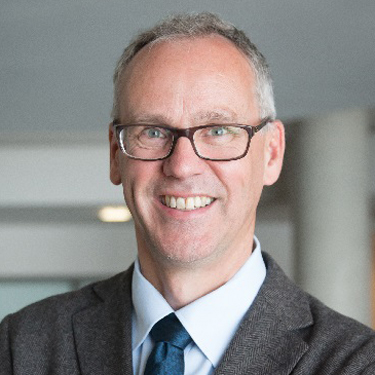Dr. Jan Willem Gorter

Jan Willem Gorter, MD, PhD, FRCP(C) is the Director of CanChild, and Professor in the Department of Pediatrics and an associate member in the School of Rehabilitation Science at McMaster University. He has been an investigator at CanChild since 2008. Jan Willem has training in rehabilitation medicine (physiatry) with a special clinical and research interest in transition services for youth with developmental disabilities. He completed his post doctoral training at CanChild in 2002 and was co-founder of NetChild Network for Childhood Disability Research in the Netherlands (January 2003). Jan Willem’s research at CanChild focuses on the themes of family, function and fitness and includes clinical studies and health services research. Jan Willem currently leads the Stay-FIT program which studies the effects of a physical activity and active lifestyle intervention for youth with cerebral palsy (CP). He is also co-leading the transition study (TRACE) which facilitates youth with chronic health conditions in their transition from pediatrics to the adulthood health care system.
Areas of Focus
Children and adolescents with disabilities: Life course & quality of life
Resources
Developmental trajectories of youth with disabilities, ages 12 to 25 years
This project was initiated and funded by the Ministry for Child and Youth Services (MCYS) in Ontario. The results of our synthesis have been used for the ministry’s development of a Youth Policy Framework, named stepping stones.
Read Resource
Knowledge Translation Strategic Planning for CanChild 2013 – 2018
The CanChild team decided to strategic plan for their knowledge translation activities using a framework proposed by Holmes
Read Resource
Transition to Adulthood with Cyber guide Evaluation (TRACE)
Consistent with best practice guidelines for transition developed in Ontario, the study seeks ways to improve health service delivery to youth in transition and, in so doing, to address this important contemporary health challenge.
Read Resource
Developmental Trajectories of Youth with Disabilities (age 12-25 years of age): A Knowledge Synthesis
This report is the outcome of a knowledge synthesis project on developmental trajectories of youth with disabilities, ages 12 – 25 years.
Read Resource
Aquatic Exercise Programs for Children and Adolescents with Cerebral Palsy
Aquatic exercise programs can provide a fun and motivating form of physical activity.
Read Resource
What helps adolescents with cerebral palsy to be physically active? Developing a program to support youth based on focus groups.
In this communication we want to share our study protocol as part of a program to support physical activity for youth with cerebral palsy (CP) using a focus group methodology.
Read Resource
Letting go (at least a little bit)
Jan Willem Gorter discusses teens in transition in this video produced by the Cerebral Palsy Foundation. What do you do to encourage your child’s independence?
Read Resource
The F-words of Disability (Video)
Jan Willem Gorter sums up the groundbreaking “F-words” paper in 30 seconds in a video produced by the Cerebral Palsy Foundation.
Read Resource
Meet Jessica (Video)
In this video, Jessica (a community advisor on cerebral palsy research and person with lived experience) and Jan Willem (a clinician researcher studying cerebral palsy) tell us about cerebral palsy, some of the misconceptions that surround it and what we can do to tackle them. Produced by the Ontario Brain Institute for Brain Awareness Week 2017.
Read Resource
Growing up with CP: Mental health & well-being
CP-NET is excited to present “Growing up with CP: Mental Health & Well-being,” a webinar initiated and led by young adults for young adults. Highlighting both lived experience and recent research from the CP-NET MyStory project, this webinar will explore the intersection of mental health and CP, and discuss how we can better support young people in developing positive outcomes in mental health and well-being.
Read Resource